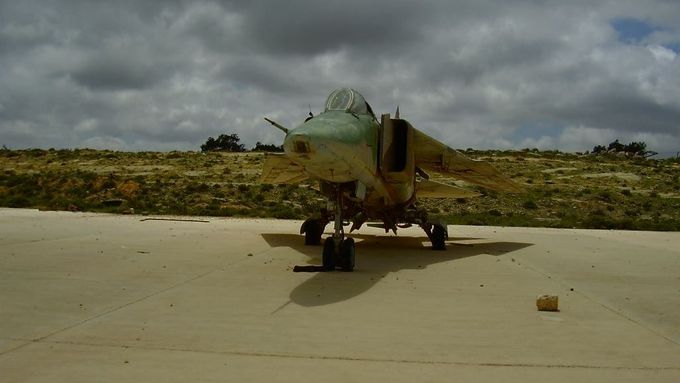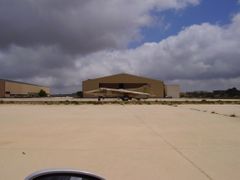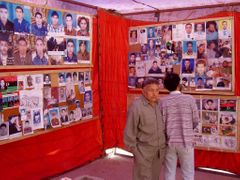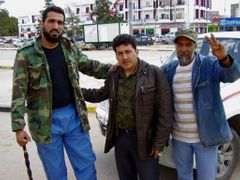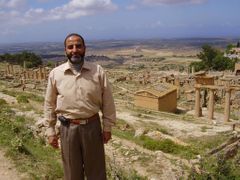Al Bayda, Libya - Gaddafi's fighter jets stay abandoned on the ground of the Labrak airport near Al Bayda, North-Eastern Libya. Hangars are opened, empty, and pierced with bullet holes.
There is a used rocket launcher lying next to an escalator for passengers of regular flights from Tropoli. Flights from Al Bayda were suspended a long time ago, and the escalator is not working.
Above the entrance gate to the airport flies a red-black-green flag of the "free Libya".
Before it could be hoisted, the airport saw one of the biggest dramas of the ongoing Libyan crisis.
Back then, large military transport planes, produced by a Russian aircraft manufacturer Ilyushin, were transporting Gaddafi's special forces and African mercenaries armed with automatic weapons to the airport.
Read more: From Libya, with love. Gaddafi's camels in Eastern Bloc
Read more: NATO should intervene in Libya: Czech Defense Minister
These troops were moved to Al Bayda in order to crush the growing eastern rebellion.
Used ammunition still lying on the ground indicates that the battle, which took place in the middle of February 2011, at the very beginning of the ongoing conflict, was fierce.
Volunteers from Al Bayda and Shahat, including government soldiers that had joined the rebellion, were trying hard to prevent the regime's highly armed soldiers from entering the city.
Read more: Czech companies lose EUR 6 mil due to Egypt revolt
Some of Gaddafi's men managed to do it nonetheless, but after three days of intense fights, Al Bayda was declared the first Libyan city liberated from Gaddafi's rule.
Hundreds of people died during the battle.
How did it start?
Even though it is generally believed that the anti-Gaddafi rebellion started on 17 February, there had been a large protest in Al Bayda one day earlier, claiming lives of fifteen people. They were probably the first victims of the ongoing conflict.
"After those fifteen were killed, all people got out of their houses and simply overpowered the soldiers and policemen protecting Gaddafi. Here, in the airport, many people died on both sides, some rebels were dragged by soldiers into the planes and flown away. Since than, nobody has known anything about them," explained the commander of the airport dressed in a plain military uniform, with the only indicator of his allegiance being a red-green-black badge on his chest.
The city is situated at the feet of a mountain called Jabal al Akhdar, or the Green Mountain. As the name indicates, the region is one of the few green zones of otherwise dry and hot Libya. Snow falls there every winter.
The city's central square offers the same sight that can be seen in other "Gaddafi-free" cities - in a makeshift temple, there are photos hanging on the walls with names of those killed by the regime either during the current rebellion, or in previous years.
Locals try to stay optimistic when it comes to the issue of Gaddafi still controlling Tripoli and most of Western Libya. "Everybody is looking forward to hear that he (Gaddafi) is dead. But I expect that in one, two months, everything can be over," believes Ali Hamid, who works in the temporary city hall.
Although there is still some fighting going on, Eastern Libya starts to work as an independent state.
There is no police, because the Gaddafi-era security forces have not returned to work, and police stations are burned down and looted, but every city or village has its own council that governs it.
On the roads connecting the towns there are roadblocks manned by men armed with Kalashnikovs and in some cases even with anti-aircraft weapons, even though they are of little use lately given the continuing NATO-implemented aircraft use embargo.
"We are no warriors"
Electricity and water supply is experiencing no shortages, and so far there has been no serious problem with gas supply. However, food rations are getting short. There are long queues for bread and the food prices have hiked sharply.
People in Al Bayda are determined to endure these hardships though. "We are no soldiers, no warriors. We are ordinary people who want a better future for themselves and for their children," said Hamid.
As he is saying it, three men are getting off their car in the parking zone. Two of them are supporting the weight of the youngest one, who has to walk using a stick. He shows an injury right below his knee: "Ras Lanuf", he says in an important tone. He was injured during the battle over an oil refinery a few weeks ago. The refinery is currently controlled by pro-Gaddafi forces.
The hatred towards the leader of Libya is seen everywhere, especially on the walls of the central square, filled with anti-Gaddafi caricatures, portraying him not only as a monster, but as a defeated monster. For example, one one painting Gaddafi is shown decapitated.
Welcome, international media
"Don't look so surprised, in this part of Libya you hardly find a family that hasn't lost somebody due to Gaddafi. And for him, we are all rats," said one of the inhabitants of Al Bayda, attracted by the presence of a foreign journalist.
Some graffiti express gratitude to TV networks such as BBC, Al-Jazeera, or CNN. Al-Jazeera news broadcast is watched in nearly every café and store. People in Al Bayda are waiting for good news from Tripolis, and they believe that the coverage made by these foreign networks made the world intervene in Libya.
And foreign journalists are still greeted with excitement - the author of this story was constantly offered help by ever-smiling inhabitants of Al Bayda. On the Egyptian border, a custom officer even apologized for the control taking so long.
Sightseeing? Maybe later
However, amid all the fighting, political tension, and foreign intervention, there is also a different Libya. Very close to Al Bayda and the Labrak airport battlefield lie ruins of Cyrene, an old Greek and Roman city.
Before the rebellion, one of the most important sights of the southern Mediterranean was a popular tourist destination. Now, it is deserted. There is no staff, no entrance fees. A guard called Nadzhib is watching the place only in order to make sure that nothing gets stolen.
"Gaddafi has built a luxury hotel. Here, above Cyrene. I hope he won't build any more hotels in Libya," Nadzhib smiled.
